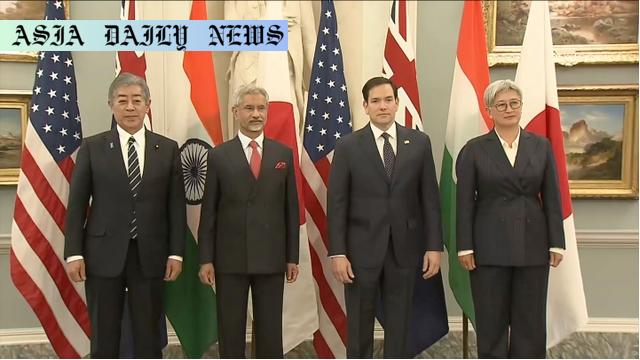Foreign ministers from Japan, the US, Australia, and India held Quad framework talks in Washington to enhance regional cooperation.

The Quad Framework: A Pillar of Regional Stability
The Quadrilateral Security Dialogue, popularly known as the Quad, represents a significant collaborative effort between Japan, the United States, Australia, and India. On Tuesday, the foreign ministers from these four nations gathered at the U.S. State Department in Washington for critical discussions aimed at reinforcing cooperation in the Indo-Pacific region. These discussions take place amid mounting global challenges and shifting geopolitical landscapes.
The Key Participants and their Objectives
The meeting saw the participation of newly appointed U.S. Secretary of State Marco Rubio, Japanese Foreign Minister Iwaya Takeshi, Australian Foreign Minister Penny Wong, and Indian External Affairs Minister Subrahmanyam Jaishankar. These leaders came together with a clear agenda—to uphold the core principles of a free and open Indo-Pacific region. The discussion underscores the Quad’s commitment to promoting peace, stability, and inclusive growth in this strategically vital area.
A Renewed Commitment to Regional Security
One of the standout elements of the discussion was the reaffirmation of the Quad nations’ mutual commitment to ensuring the Indo-Pacific remains free and open. With former U.S. President Donald Trump making way for new political leadership, the meeting provided an opportunity to ensure that the Quad’s mission remains uninterrupted. The ministers explored ways to strengthen their cooperation on issues such as maritime security, infrastructure development, and digital diplomacy.
Challenges and Rising Geopolitical Tensions
The Indo-Pacific region, a key focus for the Quad, faces several security and governance challenges. From rising militarization to the complexities of globalization, ensuring stability in this region requires sustained diplomatic effort. The Quad’s emphasis on transparent governance and respect for territorial integrity demonstrates its alignment with democratic principles and global security goals. The ministers touched upon the need to counter coercive practices and unlawful activities that undermine regional stability.
Economic Collaboration and Technological Cooperation
Beyond security, the Quad also seeks to drive economic growth and technological innovation. By fostering new opportunities in trade, infrastructure investment, and technology sharing, the group aims to create a sustainable and inclusive economic framework. The meeting also highlighted how technological advancements could be harnessed to empower smaller economies in the Indo-Pacific region.
Strengthening People-to-People Ties
Another critical aspect discussed during the meeting was the need to strengthen cultural and people-to-people ties between the Quad countries. Investing in education and bilateral exchanges would ensure that the values of freedom and inclusivity resonate across borders, further cementing the Quad’s vision for the Indo-Pacific.
Conclusion: A Forward-Looking Alliance
Tuesday’s discussions were pivotal, bringing together leaders with a shared vision for a secure Indo-Pacific. The Quad’s continuous collaboration underlines its significance as a unifying force in the international arena. Moving forward, this alliance will play an increasingly vital role in shaping the region’s political, economic, and security environment, ensuring stability and prosperity for years to come.
Commentary
The Quad’s Role in Fostering Global Peace
The recent Quad meeting represents more than just another diplomatic gathering—it is a testament to the evolving dynamics of international collaboration. The convergence of four major democracies focused on the Indo-Pacific demonstrates their recognition of the region’s significance in shaping the global order. As geopolitical tensions rise, the Quad not only reaffirms its stance on peace and equality but also paves the way for proactive measures.
A Step Towards a United Indo-Pacific
The Quad nations, through such meetings, illustrate the importance of foresight and collective responsibility. It is uplifting to witness countries not acting in isolation but embracing their shared values to address common threats. Whether it is ensuring maritime security or driving inclusive economic growth, such frameworks highlight the potential of unified action. This synergy between nations reflects an aspiration for a balanced and equitable world order.
Challenges Ahead and the Need for Resilience
While the Quad has achieved significant progress, challenges ahead remain daunting. With technological upheavals, economic disparities, and aggressive geopolitical maneuvers at play, the alliance must remain vigilant and adaptable. However, these obstacles only add to the Quad’s relevance and necessity. Their continued engagement emphasizes that peace in the Indo-Pacific is an achievable reality when driven by determination and collaboration.


